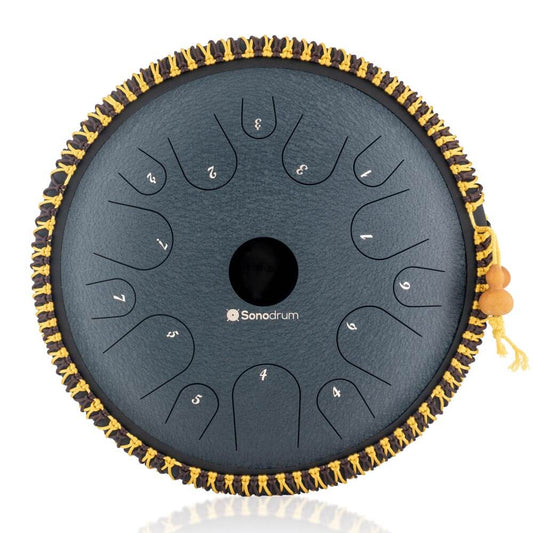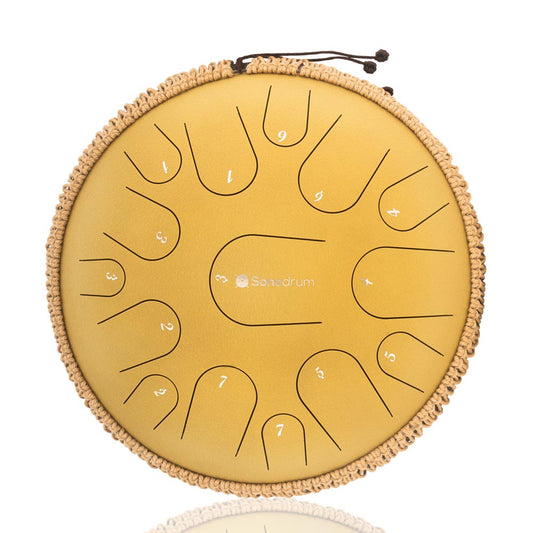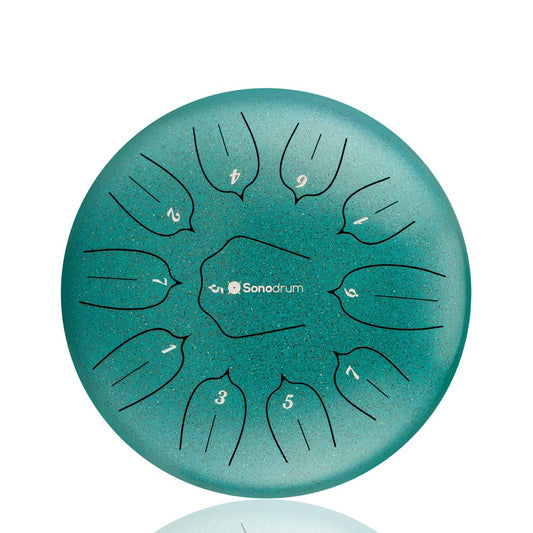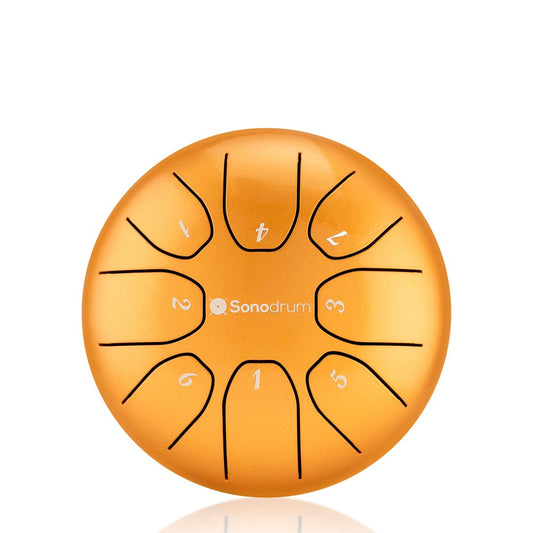If you're interested in learning a new instrument, you probably want to find one that is not only enjoyable but also relatively easy to learn. There are various instruments suitable for beginners, and among them, the tongue drum, hand drum, and shaman drum are popular options. But now, which instrument is easy to learn and why?
These instruments not only offer a pleasant musical landscape for beginners but can also lead to a profound musical experience as you develop your skills. Whichever instrument you choose, the most important thing is to have fun and discover the joy of making music.
Learning a musical instrument offers a variety of benefits that go beyond just mastering an instrument. It promotes cognitive development, especially in children. It enhances memory, concentration, and problem-solving skills. It can amplify emotional expression. Music allows for expressing feelings and emotions that are sometimes difficult to put into words. Additionally, it fosters social interaction and discipline and perseverance.
Overall, learning a musical instrument not only contributes to the development of musical skills but can also have a positive impact on various aspects of life, including cognitive, emotional, and social dimensions. Let's take a look: Which instrument is easy to learn, and what is the easiest instrument?
The Tongue Drum: An Overview
The tongue drum, stemming from the handpan, is a fascinating and versatile musical instrument that has become increasingly popular in recent years. Its characteristic design consists of a concave metal dome equipped with differently tuned tongues. These tongues can be struck with the fingers to produce melodic sounds.
The tongue drum is ideal for beginners because it is intuitive to play. Its simple and clearly defined sound zones allow even the smallest newcomers to create pleasant melodies without requiring extensive musical knowledge or technical skills. Furthermore, the tongue drum offers a relaxing and soothing sound quality that makes learning and experimenting enjoyable. Through its intuitive playing feel, beginners can quickly develop a sense of rhythm and melody, which motivates and encourages them to continue practicing and unfolding musically. Overall, the tongue drum provides an accessible and rewarding experience for anyone interested in making music, regardless of their musical background or experience.
Which instrument is the easiest to learn? Discover the relaxing world of the tongue drum.
Simple instruments can be found here. But let's focus today on the tongue drum.
Why the tongue drum?
The tongue drum is a great choice for you if you want to learn an instrument, and that for several reasons. First of all, it's really easy to play. You don't need to master complicated finger movements or advanced techniques to produce beautiful sounds. Even beginners can play pleasant melodies with relatively little practice and make quick progress.
Another reason why the tongue drum is perfect for you is its soothing and relaxing sounds. The gentle tones produced when striking the tongues have a calming effect on the mind and can alleviate stress. It's almost like meditation when you immerse yourself in the melodic sounds that the tongue drum produces. Take a look at this article for more information.
Furthermore, the tongue drum offers immense versatility and creative possibilities. You can combine various tones and rhythms to create your own unique melodies. From gentle and tranquil pieces to lively and rhythmic ones, there are endless opportunities to express your creativity and develop your own musical style.
Practical Tips for Getting Started
To begin playing the tongue drum, there are a few practical tips that can help you:
Gain basic knowledge: Before starting to play, it's helpful to acquire some basic knowledge about the tongue drum. Learn about the different parts of the instrument, basic playing techniques, and the significance of various tones. You can also improve using music books. Start with simple rhythms and melodies to get a feel for the instrument. Experiment with different striking techniques and find out how to produce different sounds. Focus on learning basic patterns and practice them regularly to improve your skills.
Find a suitable tongue drum: When choosing a tongue drum, consider factors such as sound quality, size, and tuning. Test different instruments to find out which one sounds best to you and is most comfortable to play.
Practice regularly: Regular practice is essential to make progress. Set realistic goals and dedicate time to practice every day. Even short practice sessions can help improve your skills.
Experiment with different rhythms and melodies: The tongue drum offers a variety of creative possibilities. Experiment with different rhythms, tones, and melodies to develop your own musical style and have fun playing.
Take care of your tongue drum: To ensure your tongue drum functions optimally and lasts long, it's important to take care of it properly. Keep it clean and dry, avoid excessive heat or moisture, and store it in a suitable bag or case when not in use. Occasionally, you should retune it.
Learn from others: Look for online tutorials, books, or courses that can help you learn. You can also learn from other players, whether through personal meetings or by exchanging videos and tips in online communities.
Choose a tongue drum that suits you: When selecting a tongue drum, it's important to find an instrument that matches your personal preferences and needs. Consider factors such as your musical goals, budget, and physical preferences. Test different models and tunings to find out which one best suits your playing style and ideal sound. An instrument that feels good and brings you joy will help you stay motivated and make progress.
By following these practical tips and regularly engaging with your tongue drum, you'll quickly make progress and find joy in playing.
Tongue Drum: Your Entry into the World of Music for Beginners
All in all, the tongue drum offers an inviting entry point into the world of music. Its easy playability, soothing sounds, and creative possibilities make it an ideal instrument for anyone looking to discover the joy of making music.
With these steps mentioned above, you can begin your journey as a beginner into the world of the tongue drum. Be open to new experiences, be patient with yourself, and above all: Let the music touch your soul and take you on a wonderful journey!
FAQs: Which Instrument is Easy to Learn?
Is the tongue drum really easy to learn?
Yes, the tongue drum is indeed easy for beginners to learn. Its intuitive playability allows you to quickly play basic melodies without requiring complex finger dexterity. With regular practice and patience, you can make rapid progress and enjoy the joy of making music.
Do I need musical experience to play the tongue drum?
No, you don't need any musical experience to play the tongue drum. It's designed for beginners and doesn't require any prior knowledge of music. Its easy playability and intuitive striking techniques allow you to start playing quickly and develop your skills over time. It's never too late to discover the joy of making music!
How long does it take to learn the basics of the tongue drum?
The time to learn the basics of the tongue drum varies depending on individual learning styles and dedication. However, typically within a few weeks, you can play basic melodies and rhythms. Regular practice and utilizing learning resources can expedite the learning process. Be patient with yourself and enjoy the learning process—the joy of making music comes with time!
Can I use the tongue drum for relaxation even if I'm not interested in music?
Yes, you can use the tongue drum for relaxation even if you're not interested in music. Its soothing sounds and gentle vibrations can reduce stress and create a relaxing atmosphere. Playing the tongue drum can be a meditative experience that helps you unwind and forget about everyday stress. It's a wonderful way to relax and be present in the moment.




